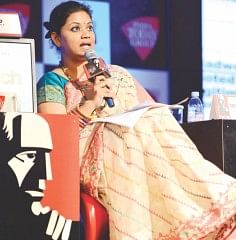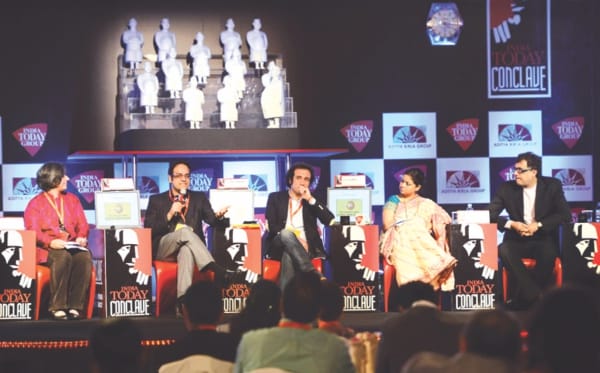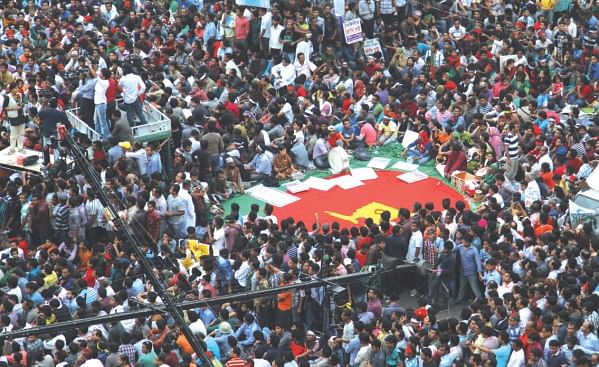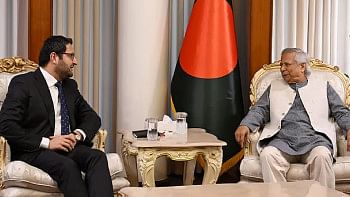Shahbag Beyond Boundaries
These are not secret meetings but assemblies that have a considerable influence on the society and perhaps on the thoughts of policy-makers of the world's largest democracy. India Today's conclave has been organised every year since 2002 on topics that range from the emergence of India as a global power to poverty eradication, challenges of change, leadership and many more. Distinguished personalities from all over the world have participated in the conclaves giving speeches, engaging in discussions and debates.
 Aziza Ahmed voicing her views at India Today’s Conclave. photo: India today conclave
Aziza Ahmed voicing her views at India Today’s Conclave. photo: India today conclave
This year the theme was Reinventing Democracy, focusing on the people's movements worldwide that have challenged autocratic regimes or voiced against failed systems, putting more demands on the 21st century governments across the world. Aziza Ahmed, an activist of Bangladesh's own 2013 Shahbag movement participated in the conclave to share her view of social media's role in making people's voices heard. She explains that the Shahbag movement has become a part of reinventing democracy as people of the new generation today are using various tools like social media to voice what they have to say. “My speech was to explain how social media gave voice to the voiceless meaning it is the voice of people,” she adds. “ Since early days I was concerned about how international media has been covering Shahbag, initially I noticed they ignored the movement, later after much hue and cry they started mentioning it however the tones still remain biased.” she says. Aziza is one of the many participants of the Shahbag movement who volunteered to raise a voice in the social media to draw attention of the media beyond borders.
Mentioning the response to her speech, she says “They wanted to know if our movement was inspired by 'Nirvaya, Occupy Wall Street or Arab spring?” Ahmed had explained that the Shahbag movement was not just an impulse to follow on the footsteps of Arab Spring or Occupy Wall Street. It started over the blogs that had been raising the issue for many years now, however finally getting critical mass after Qader Molla's verdict. She says, “It is difficult for them to believe that only youths are running this movement of ours and they could create such an impact”
Her speech helped the audience to get the bigger picture of the movement. The audience appreciated the spirit of the movement and how it reconnected the youth with the Liberation War. She says that the audience also appreciated the fact that 42 years after liberation, the youth of Bangladesh are not busy only with their material world but have kept the spirit of the liberation and love for their country alight in their hearts. “They said that there is a lot to learn from Shahbag,” she reflects.
Ahmed's panel “Social media: Is it the voice of people” also included Twitter's International Operations' Vice President Sailesh Rao, Egyptian political scientist Dr Amr Hamzawy, and All India Trinamool Congress MP Derek O' Brien. Behind the stage too there were discussions and questions about the Shahbag movement. Ahmed remembers Sailesh Rao mentioning how international media has portrayed this movement as a protest against Islamist parties. Rao mentioned to Ahmed that, the protestors should continue to stress on the social media and explain to the world how this movement is not about religion.
 Well-known personalities participated in the Conclave. photo: India today conclave
Well-known personalities participated in the Conclave. photo: India today conclave
From the audience's panel which included people from different social groups, Ahmed received one particular question that she found difficult to answer. They asked about countering the opposition of a movement, when both the pro and anti groups are using the same social media tools such as Twitter and Facebook. Ahmed admits that often the tweet and re-tweet reaches a level where the main issue becomes lost amongst both parties launching on personal attacks. “This too is a part of the nature of the movement,” she opines. “Initially I used to react and get into individual fights. Now, I do not. Whenever I understand that someone is trying to seek my attention unnecessarily, I do not even reply to those (tweets and posts). I continue to work on my agenda,” she explains.
In spite of the negative propaganda that can be fuelled through social media against a positive, non-violent movement, Ahmed is still confident about social media. It is a tool for ensuring good democratic practice and making people's opinions heard. Ahmed's objective as an online activist has been to reach out to the international audience and portray a true picture of the Bangladeshi's youth uprising of 2013. The India Today conclave has offered her with that platform. She mentions how they have appreciated one of her observations and highlighted it as a key point of the programme. “I said that fundamentalists have their own network in every country. For example, Jamaat (Jamaat-e-Islami) is getting fund from such networks. But those of us who want to form a secular humanist society, where there will be peaceful co-existence of all religious beliefs, we do not have any global humanist network, which we must work on.” We do require a global humanist network to support movements that are culturally rich and involves diverse group of people.
From the conclave, Ahmed brings back lessons of good democratic practices and how inquisitiveness and tolerance can run parallel in spite of difference in ideologies. She feels that Bangladesh too is in need of such assemblies which will give room for dialogue across various intellectual, political, cultural and social groups.


 For all latest news, follow The Daily Star's Google News channel.
For all latest news, follow The Daily Star's Google News channel. 



Comments